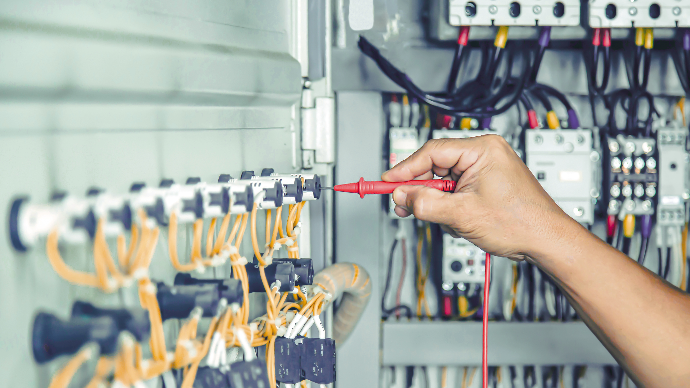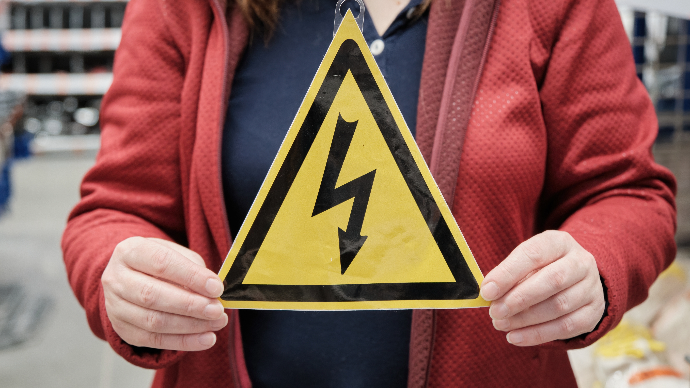Electrical Safety & Compliance is of utmost importance in commercial properties to ensure the well-being of occupants and to comply with legal obligations and regulations. Commercial landlords with up to 100 properties have expressed concerns about the safety of their electrical wiring and the potential risks it poses to tenants and employees. They also worry about meeting required standards and regulations and the legal implications if they don't.

One of the main reasons why electrical safety is crucial in commercial properties is to mitigate potential risks and hazards. Faulty electrical systems can lead to electrical shocks, fires, and other accidents that can cause harm to people and damage to property. Identifying and addressing these risks before they become major problems is essential to prevent costly damages and ensure the safety of everyone in the building.
There are legal obligations and regulations surrounding electrical safety in commercial properties that landlords must adhere to. Failure to comply with these regulations can result in legal consequences, fines, and even the closure of the property. It is, therefore, important for commercial landlords to stay updated on the latest electrical safety standards and ensure that their properties meet these requirements.
Regular electrical testing and inspections play a crucial role in mitigating risks and ensuring compliance. By conducting these tests, landlords can identify any potential issues or hazards in the electrical systems and take appropriate measures to address them. This proactive approach can help prevent accidents and costly damages, as well as demonstrate compliance with regulations.
Neglecting electrical safety in commercial properties can have serious consequences. Apart from the risk of accidents and damage to property, non-compliance with regulations can result in legal penalties and reputational damage. It is essential for commercial landlords to prioritie electrical safety and take the necessary steps to ensure the safety of their properties and the people within them. By doing so, they can protect their investments, maintain a safe environment for occupants, and avoid legal and financial troubles.
Here are the questions we get asked the most about The Importance of Electrical Safety in Commercial Properties;
- Why is electrical safety important in commercial properties?
- What are the potential risks and hazards associated with electrical systems in commercial properties?
- What are the legal obligations and regulations?
- How can regular electrical testing and inspections help mitigate risks and ensure compliance?
- What are the consequences of neglecting electrical safety in commercial properties?
Let's dive in with the first one.
Why is electrical safety important in commercial properties?
Electrical safety is of utmost importance in commercial properties for several reasons. Firstly, ensuring the safety of occupants and employees is a top priority for any responsible commercial landlord. Faulty electrical systems can pose significant risks, including electrical shocks, fires, and even fatalities. By prioritizing electrical safety, landlords can create a safe environment for everyone within their properties.
Secondly, compliance with electrical regulations is crucial for commercial landlords. In the UK, there are specific legal obligations and regulations surrounding electrical safety in commercial properties. These regulations are in place to protect the safety and well-being of occupants and employees. Failure to comply with these regulations can result in legal consequences, including fines, penalties, and even imprisonment. Therefore, it is essential for commercial landlords to ensure that their electrical systems meet the required standards and regulations.
Additionally, neglecting electrical safety can lead to costly damages and disruptions to business operations. Electrical faults and fires can cause extensive damage to properties, resulting in expensive repairs and potential loss of income. Moreover, if a fire or electrical accident occurs due to negligence, the reputation of the commercial landlord can be severely impacted, leading to a loss of trust from tenants and potential customers.
Regular electrical testing and inspections play a vital role in mitigating risks and ensuring compliance. These tests help identify any potential hazards or faults in the electrical systems before they escalate into major problems. By conducting regular inspections, commercial landlords can proactively manage electrical risks, minimize the chances of accidents or fires, and prevent costly damages to their properties.
Furthermore, regular testing and inspections provide commercial landlords with accurate and thorough reports on the condition of their electrical systems. These reports can be used as evidence of compliance with regulations and can help demonstrate the commitment to safety to tenants, employees, and regulatory authorities.
Electrical safety is of paramount importance in commercial properties. It ensures the safety of occupants and employees, helps commercial landlords comply with legal obligations and regulations, and prevents costly damages and disruptions to business operations. Regular electrical testing and inspections are crucial in mitigating risks, ensuring compliance, and providing peace of mind to commercial landlords. To learn more about our EICR Safewire Assurance Program, you can contact us here.
What are the potential risks and hazards associated with electrical systems in commercial properties?
There are several potential risks and hazards associated with electrical systems in commercial properties. Firstly, faulty electrical systems can pose a significant risk of electrical shocks. This can occur when individuals come into contact with exposed or damaged wiring, leading to serious injuries or even fatalities.
Secondly, electrical systems that are not properly maintained or inspected can increase the risk of fires. Electrical faults, such as short circuits or overloaded circuits, can generate heat and sparks, which can ignite flammable materials and cause fires. These fires can spread quickly and result in extensive damage to the property, as well as potential harm to occupants and employees.
Furthermore, outdated or inadequate electrical systems can lead to power outages and disruptions to business operations. This can result in financial losses and inconvenience for tenants and employees. In commercial properties, where electricity is essential for day-to-day operations, any interruption to the power supply can have significant consequences.
Additionally, improper installation or use of electrical equipment can increase the risk of accidents and injuries. For example, using extension cords as a permanent solution or overloading electrical outlets can lead to overheating and electrical fires. Similarly, using faulty or counterfeit electrical equipment can pose serious risks to safety.
Moreover, poor electrical maintenance can result in deteriorating wiring and electrical components. This can lead to increased energy consumption, higher utility bills, and decreased efficiency of electrical systems. It can also increase the risk of electrical faults and failures, further compromising the safety of the property.
There are several potential risks and hazards associated with electrical systems in commercial properties. These include electrical shocks, fires, power outages, accidents, and increased energy consumption. By addressing these risks and ensuring electrical safety, commercial landlords can create a safe environment for occupants and employees, comply with regulations, and prevent costly damages and disruptions to business operations.
What are the legal obligations and regulations surrounding electrical safety in commercial properties?
In the UK, there are specific legal obligations and regulations surrounding electrical safety in commercial properties. These regulations are in place to protect the safety and well-being of occupants and employees.
The main legislation that governs electrical safety in commercial properties is the Electricity at Work Regulations 1989. These regulations require that all electrical systems, equipment, and installations are maintained in a safe condition and are regularly inspected and tested.
Under these regulations, commercial landlords have a legal duty to ensure that their electrical systems are safe and do not pose a risk to the health and safety of occupants and employees. This includes ensuring that the electrical installations are designed, installed, and maintained by competent persons.
Furthermore, commercial landlords are required to keep records of all inspections, tests, and maintenance work carried out on their electrical systems. These records must be kept for a specified period, typically five years, and must be made available for inspection by regulatory authorities upon request.
In addition to the Electricity at Work Regulations, there are other regulations and standards that commercial landlords must comply with. These include:
- The Health and Safety at Work Act 1974: This legislation places a general duty on employers to ensure the health, safety, and welfare of their employees and others who may be affected by their work activities. This includes ensuring the safety of electrical systems in the workplace.
- The Building Regulations 2010: These regulations set out the requirements for the design and construction of buildings, including electrical installations. Commercial landlords must ensure that their electrical systems comply with the relevant building regulations.
- The Regulatory Reform (Fire Safety) Order 2005: This legislation requires that commercial properties have adequate fire safety measures in place, including the safe design and maintenance of electrical systems.
- The British Standard BS 7671: This is the national standard for electrical installations in the UK. Commercial landlords must ensure that their electrical systems meet the requirements of this standard, which covers areas such as electrical design, installation, and testing.
Failure to comply with these legal obligations and regulations can result in serious consequences for commercial landlords. Regulatory authorities, such as the Health and Safety Executive (HSE), have the power to take enforcement action against non-compliant landlords. This can include issuing improvement notices, prohibition notices, and even prosecution. Non-compliance can also lead to fines, penalties, and imprisonment.
Commercial landlords have specific legal obligations and regulations surrounding electrical safety in their properties. It is crucial for them to comply with these regulations to protect the safety of occupants and employees, as well as to avoid legal consequences. By ensuring that their electrical systems are safe, regularly inspected, and tested, commercial landlords can demonstrate their commitment to electrical safety and compliance.
How can regular electrical testing and inspections help mitigate risks and ensure compliance?
Regular electrical testing and inspections play a vital role in mitigating risks and ensuring compliance in commercial properties. Here are some ways in which these practices can help:
- Identify potential hazards: Regular testing and inspections can help identify potential hazards in electrical systems before they escalate into major problems. By identifying faulty wiring, overloaded circuits, or other issues, landlords can take immediate action to rectify the problems and prevent accidents or fires.
- Prevent electrical shocks and fires: Faulty electrical systems can pose a significant risk of electrical shocks and fires. Regular testing and inspections can help identify any damaged or exposed wiring, faulty equipment, or other issues that could lead to electrical shocks or fires. By addressing these issues promptly, landlords can prevent accidents and protect the safety of occupants and employees.
- Ensure compliance with regulations: Commercial properties are subject to specific legal obligations and regulations surrounding electrical safety. Regular testing and inspections help ensure that electrical systems meet the required standards and comply with these regulations. By demonstrating compliance, landlords can avoid legal consequences, such as fines, penalties, and imprisonment.
- Maintain the reputation of the landlord: Neglecting electrical safety can have a detrimental impact on the reputation of a commercial landlord. If a fire or electrical accident occurs due to negligence, tenants and potential customers may lose trust in the landlord's ability to provide a safe environment. Regular testing and inspections help landlords demonstrate their commitment to safety and maintain a positive reputation.
- Minimize costly damages and disruptions: Electrical faults and fires can cause extensive damage to commercial properties, resulting in expensive repairs and potential loss of income. Regular testing and inspections can help identify potential issues early on, preventing costly damages and disruptions to business operations. By proactively managing electrical risks, landlords can minimize financial losses and ensure the smooth running of their properties.
- Provide accurate and thorough reports: Regular testing and inspections provide landlords with detailed reports on the condition of their electrical systems. These reports can be used as evidence of compliance with regulations and can help landlords demonstrate their commitment to safety to tenants, employees, and regulatory authorities. Accurate and thorough reports also provide landlords with valuable insights into the condition of their electrical systems, allowing them to make informed decisions about maintenance and upgrades.
Regular electrical testing and inspections are crucial in mitigating risks and ensuring compliance in commercial properties. These practices help identify potential hazards, prevent electrical shocks and fires, maintain compliance with regulations, protect the reputation of landlords, minimize costly damages and disruptions, and provide accurate and thorough reports. By prioritizing regular testing and inspections, commercial landlords can create a safe environment for occupants and employees while meeting their legal obligations. To learn more about our EICR Safewire Assurance Program, visit [insert Call to Action].
What are the consequences of neglecting electrical safety in commercial properties?
Neglecting electrical safety in commercial properties can have severe consequences for both landlords and occupants. Here are some of the potential outcomes of disregarding electrical safety:
- Increased risk of accidents and injuries: Faulty electrical systems can pose a significant risk of electrical shocks, which can lead to serious injuries or even fatalities. Neglecting electrical safety increases the likelihood of accidents occurring, putting the well-being of occupants and employees at risk.
- Fires and property damage: Electrical faults can cause fires, which can spread quickly and result in extensive damage to the property. Not only can this lead to costly repairs, but it can also disrupt business operations and potentially cause financial losses. Additionally, fires can harm occupants and employees, further emphasizing the importance of electrical safety.
- Legal consequences: Commercial landlords have legal obligations and regulations to comply with regarding electrical safety. Neglecting these regulations can result in legal consequences, including fines, penalties, and even imprisonment. Regulatory authorities, such as the Health and Safety Executive (HSE), have the power to take enforcement action against non-compliant landlords, which can have severe financial and reputational implications.
- Damage to reputation: Neglecting electrical safety can damage the reputation of commercial landlords. If an electrical accident or fire occurs due to negligence, tenants and potential customers may lose trust in the landlord's ability to provide a safe environment. This loss of trust can lead to tenant turnover, difficulty attracting new tenants, and a negative impact on the landlord's overall reputation.
- Financial losses: Electrical accidents, fires, and property damage can result in significant financial losses for commercial landlords. The cost of repairs, insurance claims, and potential legal fees can add up quickly, impacting the financial stability of the landlord. Additionally, disruptions to business operations can lead to loss of income and potential tenant vacancies, further exacerbating the financial consequences.
- Non-compliance with insurance requirements: Insurance policies for commercial properties often have specific requirements regarding electrical safety. Neglecting electrical safety measures can result in non-compliance with these requirements, which may void insurance coverage. This leaves commercial landlords financially exposed and unprotected in the event of an electrical accident or fire.
Neglecting electrical safety in commercial properties can have severe consequences, including increased risk of accidents and injuries, fires and property damage, legal consequences, damage to reputation, financial losses, and non-compliance with insurance requirements. By prioritizing electrical safety and ensuring compliance with regulations, commercial landlords can create a safe environment, protect their properties and occupants, and avoid these detrimental outcomes. Learn more about our EICR Safewire Assurance Program to ensure the safety and compliance of your commercial properties.
Electrical safety plays a crucial role in commercial properties to ensure the well-being of tenants and employees. It is important to address potential risks and hazards associated with electrical systems to prevent accidents and comply with legal obligations and regulations.
Risks and hazards in commercial properties can include electrical fires, electric shocks, and equipment malfunctions. Regular electrical testing and inspections help to identify any issues or potential risks before they become major problems. This proactive approach not only mitigates risks but also ensures compliance with safety regulations.
Speaking of legal obligations, commercial landlords must adhere to various regulations and standards. Failure to meet these requirements can lead to serious legal implications, including fines, penalties, and even closure of the property. Therefore, it is crucial for landlords to prioritize electrical safety and stay up-to-date with the necessary regulations.
To manage the process efficiently, commercial landlords can benefit from a reliable and trustworthy electrical testing company. Like T&M, we specialise in fixed wire testing for commercial properties and provide accurate and thorough reports. By partnering with such experts, landlords can save time and ensure that the testing and inspection process is handled professionally.
Budget constraints are a common concern for commercial landlords. However, neglecting electrical safety can result in more costly damages in the long run. Fortunately, there are cost-effective solutions available for regular electrical testing and compliance. By investing in these services, landlords can protect their properties, tenants, and employees while also minimizing the risk of expensive repairs or replacements.
Prioritising electrical safety in commercial properties is essential for the well-being of occupants and compliance with regulations. By addressing potential risks, fulfilling legal obligations, and partnering with reliable testing companies, commercial landlords can ensure a safe environment, minimize disruptions to business operations, and protect their investments. Learn more about our EICR Safewire Assurance Program to take proactive steps towards electrical safety and compliance.
Electrical Safety & Compliance


